Catastrophe (25 page)
Authors: Dick Morris

After that short, helpful stint in 2001, BMS didn’t re-up with Marwood. But in 2003, when BMS needed help with the Senate Labor, Health, and Education Appropriations bill, guess who they turned to? The one firm that had a unique connection to the Senate Health, Education, Labor and Pensions committee: Marwood. This time it paid the firm $80,000—in part for its help on an appropriation to permit Medicare reimbursement for myocardial profusion imaging. BMS knew a good thing when it saw it! This time Marwood disclosed that it had contacted the Senate to lobby for BMS. Wonder which senator it called first?
Marwood attracted two other clients in its first year. One was the Advanced Medical Technology Association, a huge trade association that represents manufacturers of medical devices (such as Medtronics), medical software, equipment, and supplies. According to Marwood’s 2001 lobbying disclosure form, it was hired to:
Inform policy makers about Advanced Medical Technology and its membership.
This is not a joke.
Apparently, Advanced Medical spent $40,000 in order to have the Marwood Group introduce it to the very same federal agencies it had been lobbying for years on its own and through hired firms. To give you an idea of the scope of its lobbying practice, Advanced Medical spent more than $7 million in the two years before it hired Marwood. So why would it need to hire this young firm to tell the agencies about itself and its membership? Hmm…
Once again, the disclosure lists a number of “lobbyists”—but claims that it never contacted members of the House or Senate in the course of its work for Advanced Medical.
Do you see the pattern that’s emerging here? Did Ted Kennedy, Jr., set up two meetings with his father in exchange for that $40,000 fee? What else could the firm have done for the money that one of Advanced Medical’s other lobbying firms couldn’t have done? Whatever services Marwood performed, Advanced Medical shelled out roughly $160,000 to the firm over a three-year period.
Advanced Medical has hired firms to lobby on health care issues, including Medicare and Medicaid reimbursement and appeals and legislation regarding medical devices, and on federal budget matters. Guess who is extremely influential on all those issues?
Advanced Medical is no stranger to Senator Kennedy’s office. Its current executive vice president is David Nexon—who served as a senior policy adviser on health care for the senator before joining Advanced Medical Technology. After Nexon took over in 2005, Advanced hired another Kennedy Jr.–related lobbying firm, WayPoint Advisors, paying the firm $40,000 each year for the next two years to work on legislation dealing with medical devices and Medicare lab fees.
All told, Advanced Medical paid Marwood and WayPoint $200,000.
Here’s a list of Marwood’s federal lobbying clients, and their fees, from 2001 to 2004.
THE MARWOOD GROUP
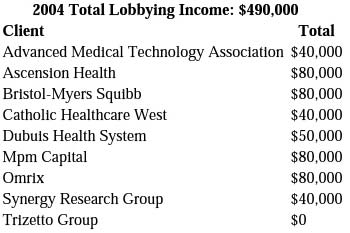
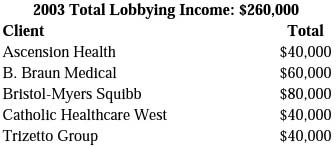
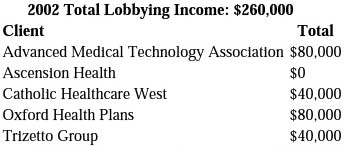

Source:
“2004 Total Lobbying Income,” Center for Responsive Politics, www.opensecrets.org/lobby/firmsum.php?lname=Marwood+Group&year=2004.
According to federal lobbying disclosure records, after 2004 Marwood no longer participated in federal lobbying. That year, several unflattering stories were published detailing the unheard-of commissions—running into the millions of dollars—that Ted Kennedy, Jr., had received from labor unions and the City of Boston, with some help from his father. The Kennedys must have been anxious to avoid further stories of the kind.
Yet the fact is that although Marwood had officially closed down its lobbying operations in 2004, it hadn’t gone out of business. Marwood’s clients simply migrated to another Kennedy Jr.–related entity, Waypoint Advisors.
When Waypoint filed its first lobbying disclosure in mid-2005, it listed the same address, phone number, and lobbyist—and, coincidentally, the same clients—as Marwood. So why did Waypoint suddenly take the place of Marwood? Was it to distract attention from the connection between health care lobbying work and Ted Kennedy, Jr.?
By the end of the year, Waypoint Advisors had moved to a new address, listed a new phone number, and disclosed several new lobbyists.
Here’s a list of Waypoint’s lobbying clients for 2005 and 2006:
WAYPOINT ADVISORS, LLC
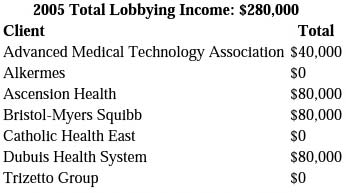
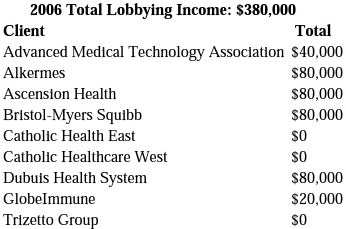
Source:
Center for Responsive Politics, www.opensecrets.org.
Anything about those lists look familiar? Did you notice that Waypoint’s clients are the same firms that used to retain Marwood? Just as it had once turned to Marwood for help on Medicare reimbursements, now BMS looked to Waypoint to handle the issue—and added the Prescription Drug Access Program to its wish list.
All these issues, of course, involved matters before Senator Ted Kennedy’s committee.
In 2006, pushed by Senators McCain and Obama, Congress began seriously exploring lobbying reforms—including a ban on lobbying by spouses and immediate family. Press reports began to focus on spouses who lobbied. It was a kind of scrutiny the Kennedys couldn’t have welcomed; the writing was on the wall.
For whatever reason, Waypoint Advisors closed down its lobbying business at the end of 2006. But it still maintains a Washington office and can
be reached at the phone number originally listed for the Marwood Group. What it does is anyone’s guess.
Before the new reforms took effect in 2007, it was neither illegal nor a violation of the Senate ethics rules for a family member of a senator to be a lobbyist. It certainly should have been. Think about it: in some situations, paying a family lobbyist could be a way to funnel money to a senator. It’s unlikely that any such thing happened here, but at the very least Ted Kennedy, Jr.’s, Marwood/Waypoint business created an appearance of impropriety. On an even more basic level, it just doesn’t look good for the family of an elected official to benefit financially because of his ability to set up meetings in the Senate. If they can get paid five figures for setting up meetings, what else might they be tempted to offer for sale?
But things have substantially changed. The wide-ranging lobbying reforms Congress passed in 2006 included a ban on lobbying of a senator by a spouse or immediate family.
The new rules prohibit all “official contacts” between a senator or his personal, committee, or leadership staff and any spouse or immediate family member. That would make it hard for someone like Ted Kennedy, Jr., to “contact” his father about his clients’ concerns. And it would make it impossible for any of his business entities to market their unique selling proposition: access to power.
These reforms were serious. Legislators also passed a Sense of the Senate stating that: “lobbyists should not use a family relationship to gain special advantage over other lobbyists.” This meant one thing: it was time for Ted Kennedy, Jr.’s, firms to get out of the lobbying business. The days of family members profiting because their spouses or parents are influential senators are over.
Amen.
So now that his firm has been officially forced out of the public lobbying business, what does Ted Kennedy, Jr., do now?
It’s hard to tell exactly, since Marwood doesn’t have to disclose its clients or its business.
The Marwood Group goes out of its way to suggest that it has little to do with government relations. The company’s current Web site—which is blocked to outsiders except for a very simple home page—describes it as a “healthcare advisory and financial services firm headquartered in New York
City with offices in Washington, DC and London.”
334
That wording seems designed to leave the impression that Marwood is merely an investment firm that happens to do business with New York, D.C., and London locals.
But
Business Week
described the firm in a slightly different way in an entry updated as of 2008:
The Marwood Group LLC is a business development and government relations consulting firm. The firm offers strategic marketing, joint-venture assistance, and government relations advisory services to healthcare service providers, pharmaceutical, bio-technology, medical devices, and financial service institutions and organizations.
335
What’s the difference? Well, according to
Business Week
, Marwood is an organization with a professional interest in what is happening in Washington.